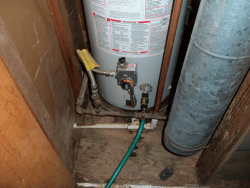Are New Water Heaters Safer?
If you haven’t purchased a new gas-fired standard water heater in the past 10 years, you may be in for a surprise when you start looking at prices and designs. Of course, it’s no surprise that nothing seems to be getting cheaper these days! However, the good news is that a new water heater purchased today is probably safer than the old tank you are replacing. Let’s take a quick look at modern “Flammable Vapor Ignition Resistant” (FVIR) water heaters, and find out why this is the case.
Accidental Fires ‘Spark’ Changes
Firefighters around the country have documented for many years house fires caused by storing flammable liquids such as gasoline and paint thinner in close proximity to gas-fired appliances like furnaces, boilers, and water heaters. While furnace and boiler designs steadily changed over the past 30 years, with safer designs part of those changes, water heaters changed very little. The easily accessible opening in the front, bottom section of older water heaters, where the pilot light can be found for relighting, has been shown to be a source of many easily avoided fires. This issue has now been addressed by our industry and anyone replacing a residential water heater today will see changes that make it much more difficult for flames to ‘roll out’ from the heater and ignite flammable vapors that have been inadvertently stored nearby.
Safer Designs Mandated By Law
 Effective just over 10 years ago, water heater manufacturers were required by law to modify the design of the standard water heater:
Effective just over 10 years ago, water heater manufacturers were required by law to modify the design of the standard water heater:
- One design change altered the pathway of combustion air into the burner compartment to improve combustion safety.
- A ‘flame arrestor plate’ was also added, which helps prevent burner rollout.
- Lastly, a ‘flame rollout safety device’ is now required, which will automatically shutoff the water heater if the flame escapes certain boundaries.
Along with these safety improvements has been the creation of a ‘sealed’ burner compartment, which makes relighting the pilot more challenging than it used to be. As a result, new water heaters typically come equipped with a piezo igniter (think BBQs) so that you won’t need to break out tools and get all upside down if you need to relight the pilot.
Look For These Safety Updates In All Residential Tanks!
The design updates discussed here are now included in all residential tank-type water heaters with a volume of 30 to 50 gallons, and gas input up to 75,000 BTU input. This covers the vast majority of water heaters used in residential applications.
In the Denver and Boulder, Colorado area, contact Save Home Heat Company for professional water heater repairs, and for expert advice and recommendations on a replacement heater that makes the most sense for your family and your home!




